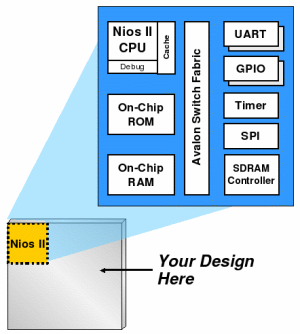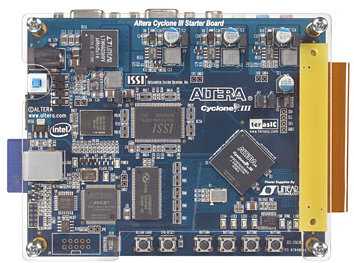Linux development framework targets FPGA soft cores
Oct 26, 2009 — by Eric Brown — from the LinuxDevices Archive — 7 viewsTimesys announced that its LinuxLink development framework now supports Altera's Nios II 32-bit soft RISC processor cores, which are available for Altera's FPGAs. LinuxLink for Nios II includes a board support package (BSP) for Altera's Nios II Embedded Evaluation Kit and Embedded Systems Development Kit, Cyclone III Edition, says Timesys.
Altera announced its Nios II 32-bit soft RISC processor cores for the company's field programmable gate arrays (FPGAs) in 2004. Supporting uClinux, the upgraded "II" version of the original Nios soft cores targets software-intensive custom processor designs for Altera FPGAs such as its Cyclone III. Like other FPGAs, the Cyclone III is aimed at projects for which application-specific integrated circuits (ASICs) would be too costly and time-consuming to produce.
Soft cores aim to reduce the cost, complexity, and power requirements of embedded processors by enabling designers to add custom peripheral mixes directly inside the processor chips, along with custom logic circuits.

Altera's NIOS II architecture

Altera's Nios II Embedded Evaluation Kit, Cyclone III Edition host board
Each Factory-built LinuxLink platform includes a GNU-based Linux cross toolchain, hundreds of application-specific root filesystem (RFS) package sources, and commonly used open source development tools, including GDB, OProfile, and Mpatrol, says Timesys. Subscribers also receive technical support and targeted documentation, says the company.
Included with LinuxLink is an Eclipse-based TimeStorm IDE, providing tools for application development and debugging, plus support for industry-standard JTAG probes. The Timesys services team also provides FPGA design services, says the company.
Stated Chris Balough, senior director of software, embedded, and DSP marketing at Altera, "Many of our customers are developing Linux-based products and can benefit from the availability of the LinuxLink environment."
Stated Jessica McCabe, corporate supplier manager for Software at Arrow, "LinuxLink from Timesys is a key element of the complete system-level solution that Arrow provides to customers developing products around the Altera Nios II platform."
Stated Charlie Ashton, VP of Business Development at Timesys, "The LinuxLink business model is well aligned with the requirements of Altera's customers, and we look forward to good mutual success across a broad spectrum of markets, such as industrial control, medical equipment, consumer products, networking devices and other high-volume applications."
Availability
LinuxLink, supporting Altera's Nios II processors, is available now, says Timesys. For a limited time, developers can obtain a free trial access to LinuxLink for Nios II by registering here, and entering promotion code PRNIOSII. The trial access is said to enable developers to quickly configure, build, and evaluate embedded Linux on the Nios II.
More information on LinuxLink for Altera platforms may be found here.
This article was originally published on LinuxDevices.com and has been donated to the open source community by QuinStreet Inc. Please visit LinuxToday.com for up-to-date news and articles about Linux and open source.